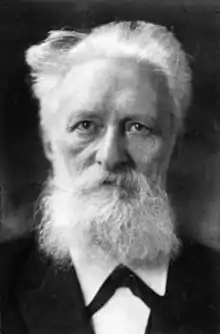beard
See also: Beard
English

A man with a prominent beard.
Etymology
From Middle English berd, bard, bærd, from Old English beard, from Proto-Germanic *bardaz (compare West Frisian burd, Dutch baard, German Bart), from Proto-Indo-European *bʰardʰeh₂, *bʰh₂erdʰeh₂ (compare Latin barba, Lithuanian barzda, Russian борода́ (borodá)).
Noun
beard (plural beards)
- Facial hair on the chin, cheeks, jaw and neck.
- The cluster of small feathers at the base of the beak in some birds.
- The appendages to the jaw in some cetaceans, and to the mouth or jaws of some fishes.
- The byssus of certain shellfish.
- The gills of some bivalves, such as the oyster.
- In insects, the hairs of the labial palpi of moths and butterflies.
- (botany) Long or stiff hairs on a plant; the awn.
- the beard of grain
- A barb or sharp point of an arrow or other instrument, projecting backward to prevent the head from being easily drawn out.
- That part of the underside of a horse's lower jaw which is above the chin, and bears the curb of a bridle.
- (printing, dated) That part of a type which is between the shoulder of the shank and the face.
- (LGBT, slang) A fake customer or companion, especially a woman who accompanies a gay man in order to give the impression that he is heterosexual.
Derived terms
Translations
facial hair
|
|
Verb
beard (third-person singular simple present beards, present participle bearding, simple past and past participle bearded)
- (obsolete) To grow hair on the chin and jaw.
- To boldly and bravely oppose or confront, often to the chagrin of the one being bearded.
- Robin Hood is always shown as bearding the Sheriff of Nottingham.
- Macaulay
- No admiral, bearded by three corrupt and dissolute minions of the palace, dared to do more than mutter something about a court martial.
- Crockett Johnson Barnaby, December 6, 1943
- We need all our operatives to insure the success of my plan to beard this Claus in his den...
- Ross Macdonald, The Chill, 1963, pg.92, Vintage Crime/Black Lizard
- . . . I bearded the judge in his chambers and told him that it shouldn't be allowed.
- (transitive) To take by the beard; to seize, pluck, or pull the beard of (a man), in anger or contempt.
- (transitive) To deprive (an oyster or similar shellfish) of the gills.
Derived terms
Translations
See also
Old English
Etymology
From Proto-Germanic *bardaz (compare West Frisian burd, Dutch baard, German Bart), from Proto-Indo-European *bʰardʰeh₂ (compare Latin barba, Lithuanian barzda, Russian борода́ (borodá)).
Pronunciation
- IPA(key): /ˈbæɑ̯rd/, [ˈbæɑ̯rˠd]
Declension
Declension of beard (strong a-stem)
| Case | Singular | Plural |
|---|---|---|
| nominative | beard | beardas |
| accusative | beard | beardas |
| genitive | beardes | bearda |
| dative | bearde | beardum |
Derived terms
This article is issued from Wiktionary. The text is licensed under Creative Commons - Attribution - Sharealike. Additional terms may apply for the media files.